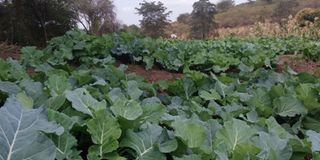How agriculture lessons have helped in my farming journey

A kales (sukumawiki) farm.
What you need to know:
- Even the agriculture practical sessions are part of the grades that we are seeking in the national exams so it is not fun.
- During my stay at home, I have been able to put to use some of the skills I learnt in agriculture with the support of my parents.
I chose to study agriculture in high school, and it only dawned on me recently that I have learnt more about the subject at home than in school.
Agriculture is an optional subject in most secondary schools, just like home science and others that seek to teach learners skills beyond books. In agriculture, a lot is taught, including low-cost farming practices for different climates locally.
We cannot achieve this in the usual school calendar where we stay in class throughout the four years. The schedule only allows us to have an intense practical project in the final year where we are also stressed about exams.
Even the agriculture practical sessions are part of the grades that we are seeking in the national exams so it is not fun.
During my stay at home, I have been able to put to use some of the skills I learnt in agriculture with the support of my parents. They have given me a small piece of land, just about the size of a quarter of a basketball pitch.
Planted sukumawiki
On it, I have planted sukumawiki (kales) and spinach. These are very important sources of vitamins. Growing these vegetables has also allowed me to observe and learn the types of pests that affect them, such as caterpillar. For the first time, I was able to control and eliminate the pests.
It is a great experience using the knapsack kits strapped on your back as you spray the plants. Planting of spinach and sukumawiki has been a stepping stone in my journey to discover more about plants. I have challenged myself to start planting thorn melon. My mother says that the melon relieves heartburn and acidity. The vegetables have also earned me some money when my neighbours buy them.
I am going to use the little money I have earned to start rearing indigenous chicken, known to many as kuku kienyeji. This is to extend my skills from crops to livestock husbandry. School taught me how to choose the type of chicken I would keep.
Thanks to classwork, I know that the indigenous breeds need little vaccination and are resilient to many diseases.
Are you aged 10-20 and would like to be Nation’s young reporter? Email your 400-600-word article to [email protected]




